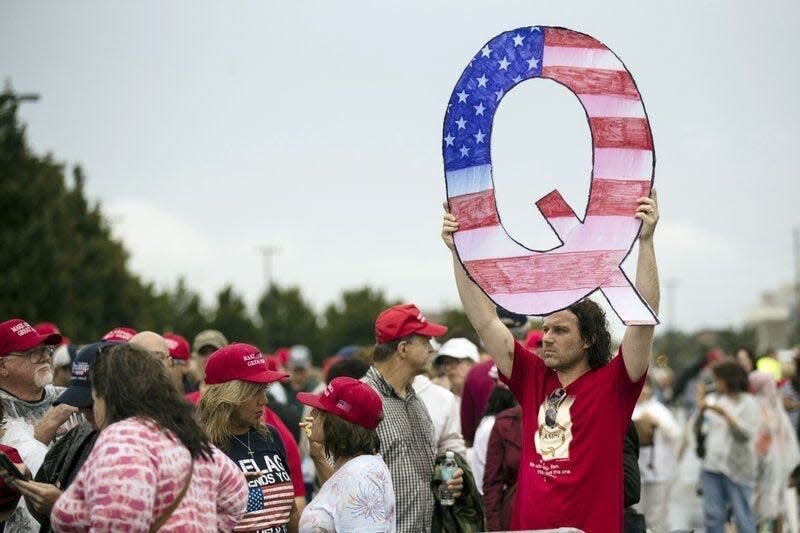No April Fool's joke: Florida ranks at top for conspiracy theorizing and gullible residents
- Oops!Something went wrong.Please try again later.
- Oops!Something went wrong.Please try again later.
Maybe Florida's nickname should be the "Deep State"?
A report by Oddspedia, a sports-betting and data-tools website, lists Florida as America's No. 1 conspiracy theory "hotspot," followed by those in California, while the Sunshine State's residents "ranked as the second-most gullible."
But Oddspedia's analysts noted conspiracy theorizing is a national pastime of sorts these days, with broad implications for this year's election.
"In the lead-up to the 2024 US elections, conspiracy theories have entrenched themselves as a notable element of American political discourse," the Oddspedia report concluded. "The impact of these theories on the presidential race is noteworthy, with the potential to either bolster or undermine a candidate’s credibility."
What's going on? Here is what Oddspedia found:
There is both a partisan divide and a national consensus on conspiracy theorizing
While just over a third of Republicans (35%) surveyed expressed "significant or moderate belief in conspiracy theories," the numbers were lower for Democrats (14%) and those not registered with a party (20%).
But red and blue states also lined up right behind Florida with California, Texas, Alabama, and New York rounding out the top five.
And conspiracy theorizing is a national sport with four-in-five Americans acknowledging at least some belief in them. Plus 83% of those who responded said they think conspiracy theories do impact public opinion on politics and 90% of Americans said they feel they can sway "voters’ perceptions on candidates."

Conspiracy theories revolve around these five topics
Fodder for conspiracy theories comes from all corners, but the Oddsedia study honed in on five topics in particular.
The most popular ones revolve around purported government cover-ups and covert operations, with President Joe Biden's home state of Delaware a focal point.
In second place, it's no surprise that post-pandemic, suspicions about "medical manipulation and misinformation" have surged, and the study cited New Hampshire as particularly interesting.
A long-term mainstay, speculation about the existence and role played by secret societies and global organizations, ranked third, with West Virginians particularly concerned about them.
Speculation about historical revisionism and hidden truths about the past ranked fourth, and people in Nebraska showed special interest in this topic.
And of course, conspiracies about the presence of extraterrestrial beings and sightings finished off the top five.
"Other popular themes Americans engage in are around technological control, entertainment and celebrity conspiracies, political plots and assassination theories, global dominance and new-world order, and environmental and weather manipulation," the report added.
Conspiracy theory: Another data dive shows Taylor Swift popular in red states. Actually, in a lot of states.
Why are conspiracy theories proliferating? You guessed it: social media.
Roughly 20% of those surveyed said they found a conspiracy theory when cruising through social media. Facebook and Twitter ranked the primary channels, according to the report.
The irony here is that 48% of respondents "indicated that they had little to no trust in information from sources outside mainstream media."
Go figure.
The Trump effect on conspiracy theories
The report didn't pin the spiral in conspiracy theories on Donald Trump. But it included a discussion on the presumptive 2024 Republican presidential nominee.
Oddspedia noted Trump "has a well-documented history with conspiracy theories" dating to the so-called birther movement, based on the unfounded allegation that then-President Barack Obama was not a natural born citizen and sought to cast doubt on his Hawaii-issued birth certificate.
More recently, Trump has been the main proponent of the baseless claims that the 2020 presidential election was rife with massive fraud, an accusation that has been widely debunked but is still powerfully gripped by his MAGA movement and many within the Republican Party.
Conservative media and right-wing voices also recently played up unwarranted beliefs about political machinations between President Joe Biden's campaign, megastar Taylor Swift, her relationship with Kansas City Chiefs player Travis Kelce and Super Bowl LVIII, won by the Chiefs.
Oddspedia noted how Biden mocked the wild speculation on social media with a post-Super Bowl comment on X, formerly Twitter, reading: “Just like we drew up.”
Antonio Fins is a politics and business editor at The Palm Beach Post, part of the USA TODAY Florida Network. You can reach him at afins@pbpost.com. Help support our journalism. Subscribe today.
This article originally appeared on Palm Beach Post: April Fool's: Florida tops conspiracy theorizing, gullible residents

